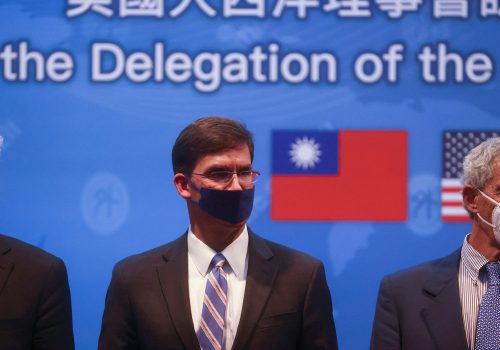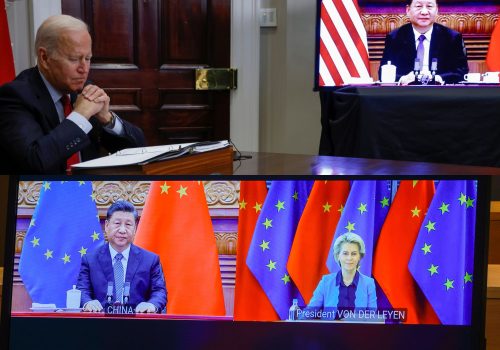The coming aftershocks from Pelosi’s Taiwan trip
GET UP TO SPEED
She went there. US House Speaker Nancy Pelosi met with Taiwanese President Tsai Ing-wen and other island officials today—despite warnings from China (and some US officials) that the visit could escalate cross-Strait tensions. In response, China announced military drills around Taiwan this week and import restrictions on the island. With Pelosi now wheels-up from Taipei, what’s coming next in the US-China showdown? And how will the trip shake up life in Taiwan? Our experts map out the terrain.
TODAY’S EXPERT REACTION COURTESY OF
- Matthew Kroenig (@MatthewKroenig): Acting director of the Scowcroft Center for Strategy and Security, and former US Defense Department and intelligence community official
- Shirley Martey Hargis (@ShirleyMHargis): Nonresident fellow at the Global China Hub and Digital Forensic Research Lab
- Jessica Drun (@jessicadrun): Nonresident fellow at the Global China Hub
Strait ahead
- Chinese leaders threatened “serious consequences” if Pelosi made the trip, but she went anyway—meaning “China’s military drills are basically a sign that China failed to achieve its goals,” Matt tells us.
- “Beijing is in a bind,” he adds. “It is trying to find some way of following through on its threat in a way that does not provoke a major war (which Beijing does not want right now either).”
- Because the Chinese exercises will take place in Taiwan’s territorial waters, one of the burning questions now is whether Taiwan and the United States will respond with their own show of force.
- “It is a game of chicken,” Matt says. “It is most likely that cooler heads will prevail, but measures like this only put pressure on the adversary because there is a nonzero risk that things will spiral out of control.”
- And that’s why the trip was not a “strategically sound decision,” Shirley argues: It will lead to a “deterioration in US-China relations and East Asia’s security environment.”
Subscribe to Fast Thinking email alerts
Sign up to receive rapid insight in your inbox from Atlantic Council experts on global events as they unfold.

Yield to the speaker
- In Shirley’s eyes, there’s only one long-term winner here: Pelosi. “She has laid out her legacy of standing for democracy and opposing autocracy,” Shirley says, going back to Pelosi’s famous visit to Tiananmen Square in 1991. The trip also helps the speaker reassert Congress’s ability to “move the needle” on foreign policy, she adds.
- At the same time, “her visit has unnecessarily accelerated tensions [with China] and may have positioned us in a two-front war in the information space with Ukraine and Taiwan,” Shirley notes, in which Russia and China, respectively, are ramping up cyber efforts.
- But Matt argues that Pelosi’s gambit will actually help deter another Ukraine-style war against Taiwan. “Like Vladimir Putin in Ukraine, Xi Jinping might decide to invade because he thinks it will be easy,” Matt says. “We need to convince him that, instead, it will mean war with the United States. This is why Pelosi’s visit is important and valuable,” since it demonstrates “an American commitment to Taiwan and to peace and stability in the Taiwan Strait.”
Just a pawn?
- As for Taiwan itself, Jessica points out that the island largely came out in favor of Pelosi’s visit—even as China pushed the counter-narrative. “It’s worth highlighting that pictures of groups critical of the trip, which are trending somewhat disproportionately online, have included manufactured outrage from those in Taiwan that have been co-opted” by China to push reunification, she says.
- Jessica notes how China’s import restrictions will hit nearly two hundred food and agricultural products, and also impact some of the island’s major conglomerates. “It will be interesting to see how this—as well as other costs that the People’s Republic of China will impose—may affect local election outcomes” in Taiwan in November, Jessica tells us. That’s when the “political viability” of China’s preferred Kuomintang party may be on the line.
- It looks like Pelosi’s visit will benefit “President Tsai in the short term, but at what cost?” Shirley wonders. Taiwan, she says, once again comes off as a “passive player” in the US-China game.
- Going forward, Shirley wants “flashy public displays like the Pelosi visit to be matched with more behind-the-scenes US support for Taiwan. Each serves a crucial purpose.”
Further reading
Thu, Jul 28, 2022
Former US Defense Secretary Esper’s five-point plan for Taiwan to deter China
Event Recap By Katherine Walla
The island must “make the first move” in shoring up its defenses and protecting its national security, said former US Secretary of Defense Mark T. Esper at the Atlantic Council.
Thu, Jul 28, 2022
Cooperation with China: Challenges and opportunities
Report By Michael Schuman, David O. Shullman
Cooperation with China should focus on areas where our interests still align and where we can keep Beijing grounded in the international system. Like-minded allies and partners must pair such efforts with commitments to defend against China’s violations of international norms, impose costs on irresponsible behavior, and strengthen themselves and current global institutions to compete effectively and uphold liberal values.
Mon, Jul 18, 2022
Dispatches from Taiwan: Follow an Atlantic Council delegation as it visits the island
New Atlanticist By
The high-level team delivers its insights, analysis, and reporting from the ground.
Image: US House of Representatives Speaker Nancy Pelosi attends a meeting with Taiwan President Tsai Ing-wen at the presidential office in Taipei, Taiwan on August 3, 2022. Photo via the Taiwan Presidential Office/Handout via REUTERS.


